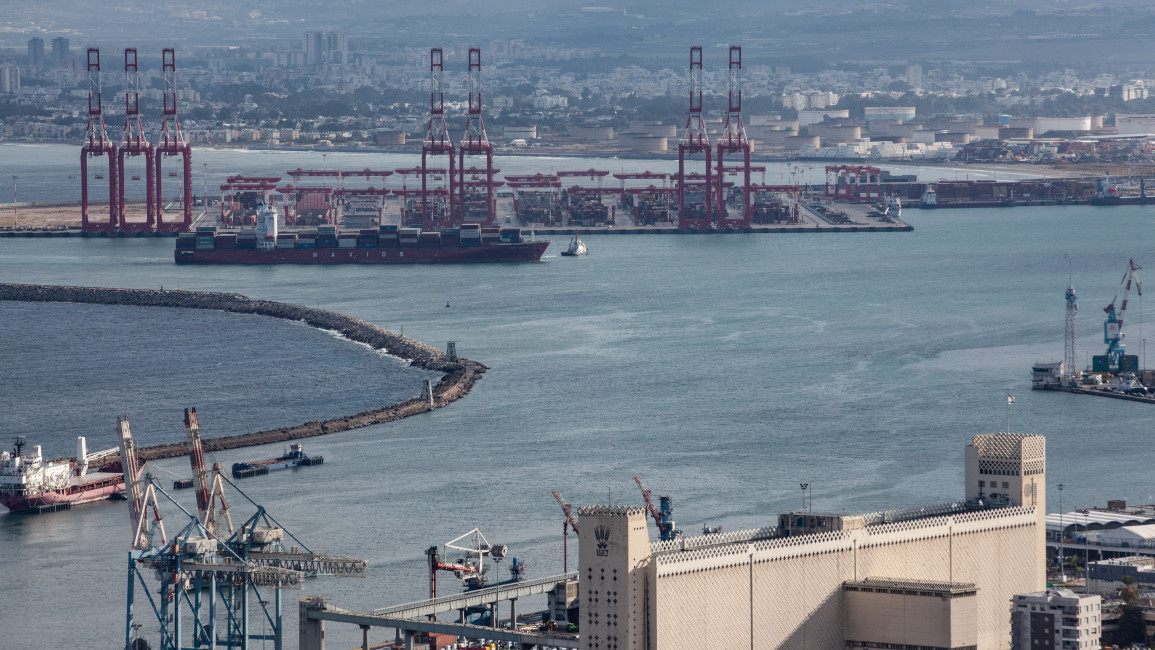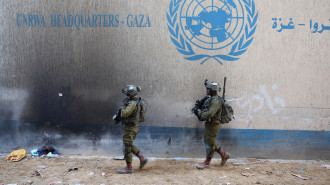
Saudi Arabia's balancing act as the US strikes Yemen's Houthis

US President Joe Biden’s recent admission that airstrikes on Yemen have failed to deter Houthi attacks on cargo shipping in the Red Sea highlights how tensions are set to continue.
Despite the ongoing strikes, initiated by the US and UK on 12 January, the Houthis have continued to target maritime commerce, hitting a US-owned vessel on 18 January.
Among those most concerned is neighbouring Saudi Arabia, even though it once spearheaded a coalition against Yemen and the Houthis with American military support.
In an interview with CNN aired on Sunday, Prince Faisal bin Farhan, Saudi Arabia’s Foreign Minister, said the Kingdom was “very worried”.
“I mean, you know, we are in a very difficult and dangerous time in the region, and that's why we are calling for de-escalation,” he said.
"While Saudi Arabia has strengthened its security ties with the US as regional tensions proliferated, it has sought to do so without aggravating the Houthis and Iran"
Mohammad bin Salman, Saudi Arabia’s ambitious crown prince, has been prioritising negotiations with the Houthis while backing UN-led peace measures since April 2022.
The Kingdom’s focus is its economic growth per its Vision 2030 agenda, and security on its southern border, is vital for this ambitious transformation.
Ultimately, while Saudi Arabia has strengthened its security ties with the US as regional tensions proliferated, it has sought to do so without aggravating the Houthis and Iran.
Yet while trying to appear detached from the crisis, Riyadh may find there’s less it can do to defuse the situation.
An escalation in Yemen
Two months ago, the Houthis started targeting Red Sea shipping after hijacking the Israeli-linked Galaxy Leader vessel in November 2023. They have justified their actions as showing solidarity with Palestinians in Gaza and as a form of ‘sanctions’ against Israel for its war, which has now killed over 25,000 people.
While Israel has faced some economic consequences, with activity in its Eilat Port dropping 85% in December, some shipping companies have been forced to divert around South Africa’s Cape of Good Hope, increasing their shipping costs and travel duration.
The US Navy's initial failure to deter these attacks has pressured Washington to intensify efforts to safeguard the Red Sea.
Subsequently, several rounds of airstrikes have hit Houthis’ missile infrastructure. While these strikes may partially degrade the Houthis’ capabilities in the short term, their missile arsenal's size, and elusive nature, coupled with their proven adaptability to airstrikes over years of Saudi-led attacks, limit the effectiveness of airstrikes.
|
|
The Houthis have gained popularity among civilians and some tribal groups after the US-led airstrikes and Washington designating the faction as a terrorist group. Senior official Mohammad al-Houthi sought to rally public sentiment against the US, stating "your strikes on Yemen are terrorism," adding that “the United States is the devil”.
Hundreds of thousands of protestors gathered in the Houthi-controlled capital Sana’a and other Yemeni cities, denouncing the American-led attacks, and expressing support for Palestinians in Gaza.
Some Yemeni factions oppose the Houthis, like the UAE-backed Southern Transitional Council (STC) which controls much of the South, whose leader Aidarous Al-Zubaidi stressed a ground force would be needed to complement airstrikes.
However, the Houthis have strengthened their popularity in Yemen and the region by aligning themselves with the Palestinian cause, cementing their leverage over Yemen.
"Despite vast defence ties, Riyadh has continued to avoid presenting an overt alignment with the US, which may be riskier given the Houthis' increased antagonism towards Washington"
Reinforcing US security ties
As regional tensions escalated with the outbreak of the Gaza war in October 2023, Saudi Arabia’s natural impulse was to reinforce its defence relationship with the United States, seeking additional security assurances.
That month, it also intercepted a Houthi missile targeting Israel for breaching its airspace. That response underscores Riyadh's primary focus on safeguarding its sovereignty and security yet showing restraint in direct confrontation with the Houthis.
Its past alliance with the US has underscored how much it relies on Washington’s security umbrella, which it would be careful not to stray from. Indeed, at the height of Yemen’s war between 2016-2020, around 79% of Riyadh’s conventional weapons were supplied by Washington, with a value of nearly $37 billion, according to the Stockholm International Peace Research Institute.
Despite attempts to diversify its partnerships, particularly with Russia and China, no one can match the level of security that Washington provides.
Although the Biden administration blocked offensive weapons sales to Saudi Arabia over the war in Yemen, it has indicated wishes to lift it, partly to uphold regional security.
For the US’ part, it has seen Saudi Arabia as an important partner for security in the Red Sea and Bab Al-Mandeb, hence its past desires to back Riyadh’s war to reinstate the Houthi-toppled internationally recognised government.
Yet with the Houthis’ rise as a new regional power, this strategy has had shortcomings.
US Secretary of State Anthony Blinken travelled to the Gulf earlier in January to discuss “the day after” in Gaza, showing how the US still seeks support from its regional Gulf state partners.
Moreover, Washington reportedly urged Saudi Arabia to raise maritime security in their ongoing political negotiations with the Houthis in late October. However, the Houthis dismissed this request, asserting that their military operations in the Red Sea were connected to the war in Gaza and not related to their dispute with Saudi Arabia.
Despite these vast defence ties, Riyadh has continued to avoid presenting an overt alignment with the US, which may be riskier given the Houthis’ increased antagonism towards Washington.
|
|
Diplomatic balancing act
Following the first round of US and UK airstrikes, Saudi Arabia called for “avoiding escalation” and said it was monitoring the situation with “great concern.”
Such apprehensions have been echoed by others, including Yemen’s eastern neighbour, Oman, which denounced the airstrikes from “friendly countries,” having itself been a proactive actor engaged in Yemen’s peace talks.
Although Red Sea security is important for Saudi Arabia, given its futuristic NEOM city and other coastal projects, it sat out of the US-led naval taskforce Operation Prosperity Guardian established on 18 December 2023. Bahrain joined, however, as the sole Arab Gulf state to do so.
Given Bahrain’s reliance on Saudi security support since its foiled 2011 Arab Spring revolution against the ruling monarchy, Manama’s participation in the task force represents a surrogate action. In other words, it acted with Saudi blessing without Riyadh itself getting involved.
Since the recent escalation, Saudi Arabia has also increased its communications with Iran to encourage de-escalation, building on past talks since October 2023. Indeed, not only has Iran increasingly armed the Houthis in recent years, but Tehran and Hezbollah have reportedly overseen Houthi attacks in the Red Sea.
Given that Iran and Saudi Arabia buried the hatchet following a China-brokered normalisation agreement in March 2023, Riyadh also wants to avoid antagonising Iran. That means Riyadh will use its improved ties with Tehran to help defuse the crisis in Yemen, ultimately reducing the risk of blowback on itself.
Risks ahead
Saudi Arabia knows that the Houthis aren’t the same faction that it fought nearly a decade ago, with the faction having struck its Aramco oil facilities numerous times, notably in 2022 and 2019.
The Houthis’ firing on Red Sea shipping and southern Israel further demonstrates its advanced missile and drone capabilities, largely owing to Iran supplying them.
Despite Riyadh’s balancing act, Yemen’s political predicament currently hinges on wider tensions between the US and Houthis, not to mention the Gaza war. Although Washington has been cautious about engaging in open conflict, late-night British and American airstrikes on 22 January came amid suggestions that more sustained military action against the Houthis may follow.
While Saudi Arabia will do whatever it can to avoid becoming entangled in Yemen militarily again, it may feel compelled to act if any tensions spilled over into its territory, or if the Houthis threaten the Saudi-backed Presidential Leadership Council (PLC).
The Houthis’ actions have clearly strengthened their hand in Yemen, while they seem to be unperturbed by the airstrikes. Even without a significant escalation in violence, Yemen’s peace process could continue to stagnate, particularly if trust with Saudi Arabia breaks down, internal tensions arise, and the US is no longer a party to negotiations.
That could also hinder vital humanitarian aid to civilians, meaning ordinary Yemenis will continue to suffer and bear the brunt.
Jonathan Fenton-Harvey is a journalist and researcher who focuses on conflict, geopolitics, and humanitarian issues in the Middle East and North Africa.
Follow him on Twitter: @jfentonharvey


![Palestinians mourned the victims of an Israeli strike on Deir al-Balah [Getty]](/sites/default/files/styles/image_684x385/public/2024-11/GettyImages-2182362043.jpg?h=199d8c1f&itok=xSHZFbmc)


![The law could be enforced against teachers without prior notice [Getty]](/sites/default/files/styles/image_684x385/public/2178740715.jpeg?h=a5f2f23a&itok=hnqrCS4x)
 Follow the Middle East's top stories in English at The New Arab on Google News
Follow the Middle East's top stories in English at The New Arab on Google News


